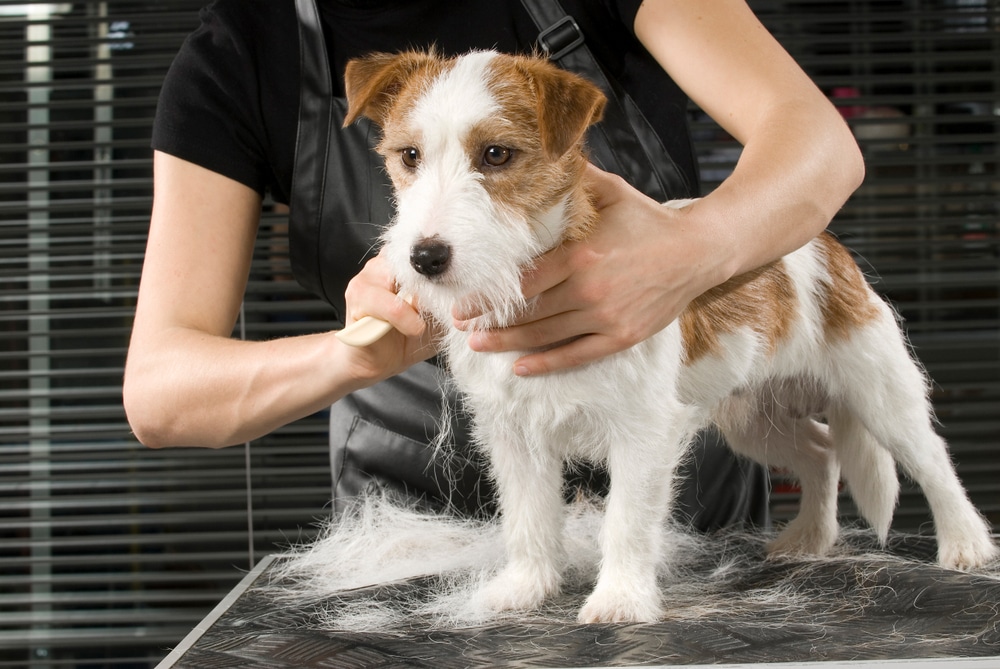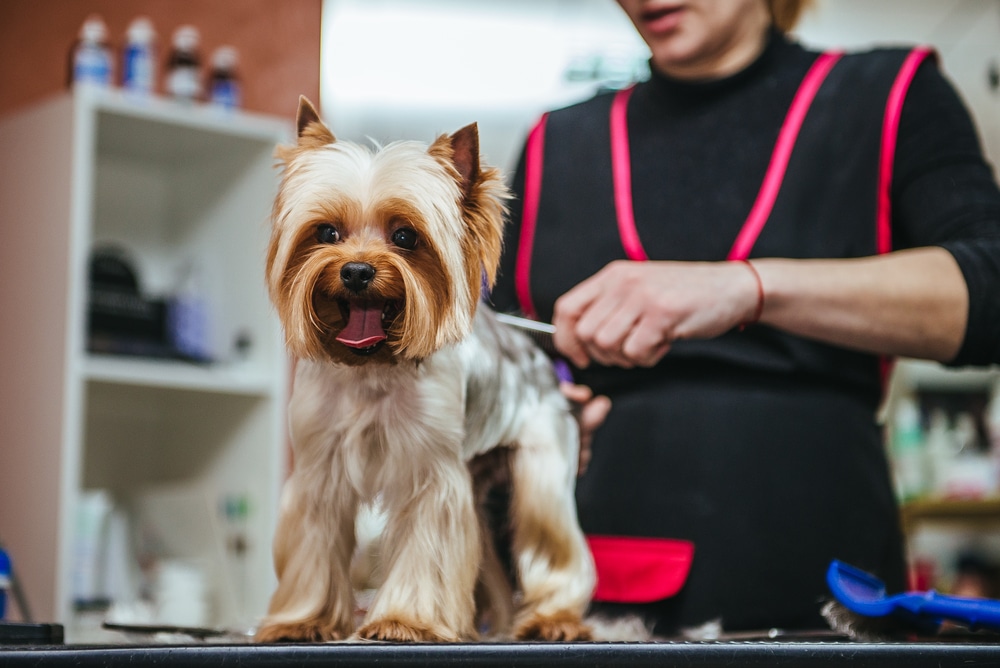Grooming is essential for a healthy dog, not only to keep their coat clean and free from tangles but also to detect any underlying health issues that may be present. However, it’s not uncommon for some dogs to act differently after a grooming session. They may seem anxious, fearful, or even aggressive. So, what could be causing this strange behavior?
Dogs act strange after grooming for a variety of reasons, including being in an unfamiliar environment, fear of the grooming tools, stressful handling, unfamiliar products, painful experiences, underlying health issues, poor grooming technique, lack of training and socialization, and separation anxiety.
Table of Contents
What Are The Benefits Of Grooming For Dogs?

Grooming is an important part of caring for our canine companions. It provides numerous health benefits that make it a vital practice for any pup, including the following:
- Grooming helps to keep the dog’s coat clean and healthy, removing dirt, dandruff, and any fleas or parasites that may be present.
- Grooming provides the opportunity for a thorough health check, allowing any changes or problems to be quickly identified and treated.
- Nail trimming is a necessary part of grooming, which helps to prevent pain or discomfort that can occur from overgrown nails.
- Grooming also serves as an important bonding opportunity between the owner and the dog, providing them with a regular chance to spend quality time together.
Why Do Dogs Act Strange After Grooming
Regular grooming is an important part of pet care, but some dogs may act differently after a session due to some factors. So, what are these factors?
Unfamiliar Environment
Dogs often feel uncomfortable in unfamiliar environments, especially when there is a loud noise or a lack of familiar smells. When taken to a groomer, the dog might become overwhelmed by the smells and sounds of other dogs, leading them to act out. It can take time for a dog to get used to these new surroundings, and it may take several visits before they start to relax.
Fear Of Grooming Tools
Some dogs may be afraid of the grooming tools used by groomers, such as clippers, dryers, and brushes. Dogs have sensitive hearing and can become startled by loud noises from these tools. Groomers need to take their time to ensure the dog is comfortable and use calming techniques to help them feel at ease.
Stressful Handling
In some cases, dogs may be handled too roughly or their coat brushed too hard during grooming sessions. This can lead to discomfort and even pain for the pup, which may cause them to act out when they return home. Groomers must handle the dog gently and use appropriate brushing techniques to ensure their comfort.
Unfamiliar Products
Some dogs may be sensitive to certain grooming products, such as shampoos, conditioners, or colognes. If these products are unfamiliar to the pup, they may cause irritation and even allergies.
Groomers should take care to use products that are appropriate for the dog’s coat type and skin condition, as well as be aware of any known sensitivities.
Painful Experiences
Grooming can be a painful experience for some dogs, particularly if their fur is matted and requires detangling. If the groomer does not take care to do this properly or uses too much force, it can cause distress for the dog and lead to feelings of fear when they return home. Groomers should be experienced in handling mats and tangles with a gentle touch.
Underlying Health Issues
Sometimes, dogs may act strange after grooming because of an underlying health issue. Grooming can be a stressful experience for some pups, so it’s important to check with your vet first to rule out any potential medical problems.
Painful conditions such as arthritis or skin infections can cause discomfort during grooming sessions and may need to be addressed before any further grooming takes place.
Poor Grooming Technique
Groomers must use proper technique when handling a pup, as this can make all the difference between a pleasant experience and an uncomfortable one. Poor technique can lead to discomfort, fear, and even injury. Groomers should be knowledgeable in the techniques used to ensure a safe and comfortable experience for the pup.
Lack of Training and Socialization
Some dogs may not have been adequately trained or socialized before their grooming session, making them fearful or anxious when handled by a stranger. Proper training and socialization can help the dog get used to being handled by someone other than their owner, making grooming sessions less stressful for everyone involved.
Separation Anxiety
Some dogs experience separation anxiety when left alone for long periods. If a pup is dropped off at the groomer and left alone for too long, this can lead to stress and anxiety, which may cause them to act out when they return home. Grooming sessions must remain as brief as possible to minimize any potential stress.
How To Prevent Bad Grooming Experiences For Your Dog
Taking steps to ensure that your dog has a positive grooming experience can help keep them happy and healthy. Here’s what to do:
- Get your pup used to being handled and groomed by gradually introducing them to new tools, products, and techniques.
- Keep an eye on the groomer’s technique during the session to ensure they are handling your pup gently.
- Make sure all grooming products used are appropriate for your pup’s coat type and skin condition.
- Check with your vet to rule out any potential health issues that may be causing stress during grooming sessions.
- Make sure the groomer is experienced in gently dealing with mats and tangles.
- Reduce the duration of the session as much as possible to minimize stress levels for both you and your pup.
Can Dogs Get Infections From Grooming?
Yes, dogs can get infections from grooming if the groomer is not careful. Groomers should take extra care to use clean and sterilized tools and equipment to avoid any potential contamination of the pup’s skin or coat.
All products used on the pup should be hypoallergenic and free of any harsh chemicals or fragrances that may irritate their skin. It’s also important to check for any known sensitivities.
In some cases, a vet-prescribed shampoo or conditioner can help reduce the risk of infection. With proper care and precaution, you can help minimize the risk of infection while keeping your pup happy and healthy.
How Long Will My Dog Act Weird After Grooming?
The amount of time it may take your pup to recover after grooming depends on the intensity of their experience. If they were treated harshly or with too much force, they might need more than a few days to recover. Any medical issues, such as arthritis or skin infections, must be addressed first before resuming regular grooming sessions.
To rebuild trust and reduce stress, show your pup patience while speaking in a calming voice. Offer treats, toys, and praise to help make subsequent groomings less stressful for them. With kindness and support, your pup should soon be back to its normal self.
In Conclusion: Why Does My Dog Act Strange After Grooming?
The root cause of your pet’s strange behavior after grooming is not always easy to identify. It may be due to a variety of things, such as stress from unfamiliar surroundings, fear or pain resulting from the process itself, or even an underlying medical condition. To ensure your pup’s well-being, you must pay close attention to their behavior and reach out to your vet if their conduct remains aberrant. With time, patience, and understanding, you can make the grooming experience more pleasant for them.
Have you had positive or negative experiences getting your pup groomed? Share your thoughts with us in the comments below! We’d love to hear from you!
